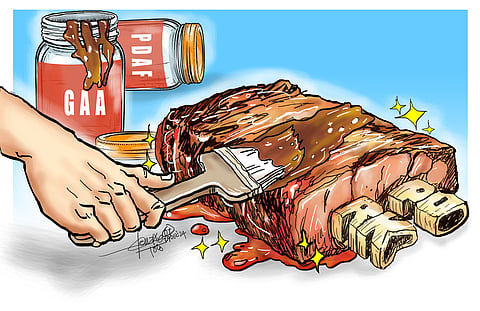
- NEWS
- the EDIT
- COMMENTARY
- BUSINESS
- LIFE
- SHOW
- ACTION
- GLOBAL GOALS
- SNAPS
- DYARYO TIRADA
- MORE

In 2013, the Supreme Court declared as unconstitutional the Priority Development Assistance Fund (PDAF) or the congressional pork barrel.
All the elements that made the pork barrel system illegal reappeared in the 2024 General Appropriations Act (GAA), particularly the provision that allowed the Department of Finance (DoF) to identify idle funds.
These so-called “excess funds” were then used to fund unprogrammed items, mostly regular programs that were bumped off to make way for congressional insertions in the budget.
In the 2013 ruling, Associate Justice Antonio Carpio called the PDAF “illegal on its face” and “riddled with unconstitutionality.”
He said the 2013 GAA violated the Constitution when it gave “Cabinet Secretaries the President’s power to realign savings and required the concurrence of both chambers of Congress to realign and release funds.”
In the past, the High Court upheld the system’s constitutionality. But the PDAF in the 2013 national budget was “a different animal,” Carpio said, because it made the identification of a lawmaker’s project “mandatory” rather than “recommendatory.”
The output of the bicameral conference committee, the final stage prior to the transmittal of the 2025 national budget of a record P6.352 trillion, showed funds were slashed for essential programs while unprogrammed items grew by P373 billion.
It is in the unprogrammed funds that the budget is juggled to accommodate the pork barrel as legislators believe that it is not within the ambit of a constitutional prohibition.
The Department of Budget and Management (DBM) supported this view through a statement indicating the unprogrammed funds are not part of the fiscal program.
“Only the programmed appropriations are subject to the constitutional prohibition against increasing appropriations recommended by the President,” the DBM opined.
A debate had raged in the House of Representatives as a faction pointed to the constitutional infirmity of the budget bill with the rising amount of unprogrammed funds beyond what was recommended under the National Expenditure Program.
Article VI, Section 25 (1) of the Constitution provides that, “Congress may not increase the appropriations recommended by the President for the operation of the Government as specified in the budget.”
Legislators, in defense of the pork insertions, argued through Article VII, Section 22 of the Constitution that states the President shall submit a Budget of Expenditures and Sources of Financing (BESF) as the basis for the budget.
Taking this into consideration, the constitutional limit to increases in programmed appropriations makes sense as it applies to the BESF, the pro-pork congressmen insisted.
They claimed that in excess of the BESF, there is no limitation imposed on Congress, and “its power of the purse, long respected by the Supreme Court, is supreme.”
Despite the defenses to justify the ballooning unprogrammed appropriations, these have the quality of the pork barrel system.
Going by the SC verdict against the PDAF, the ruling was unequivocal:
“In view of the constitutional violations discussed in this Decision, the Court hereby declares as UNCONSTITUTIONAL: (a) the entire 2013 PDAF Article; (b) all legal provisions of past and present Congressional Pork Barrel Laws, such as the previous PDAF and CDF (Countrywide Development Fund) Articles and the various Congressional Insertions, which authorize/d legislators — whether individually or collectively organized into committees — to intervene, assume or participate in any of the various post-enactment stages of the budget execution, such as but not limited to, the areas of project identification, modification and revision of project identification, fund release and/or fund realignment, unrelated to the power of congressional oversight.”
It also declared unconstitutional “all legal provisions of past and present Congressional Pork Barrel laws, such as the previous PDAF and CDF Articles and the various Congressional Insertions, which confer/red personal, lump-sum allocations to legislators from which they are able to fund specific projects which they themselves determine.”
The clincher was that the verdict also considered illegal “all informal practices of similar import and effect, which the Court similarly deems to be acts of grave abuse of discretion amounting to lack or excess of discretion.”
Jacking up the unprogrammed funds falls under this pork barrel ban.
